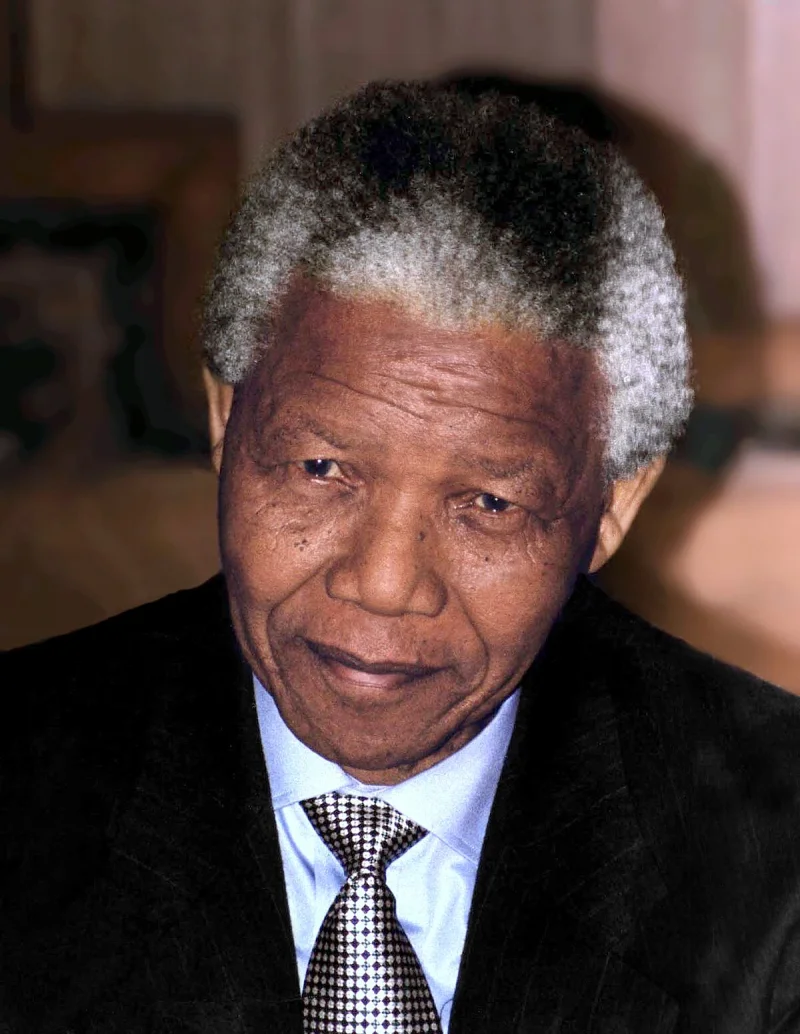Short Summary
Nelson Mandela was a pivotal figure in the fight against apartheid and became South Africa's first Black president, serving from 1994 to 1999. He is renowned for his lifelong dedication to human rights, his role in ending racial segregation, and his work towards peace and reconciliation. His legacy as a symbol of freedom and justice endures globally, making him one of the most celebrated leaders of the 20th century.
Early Life & Education
Nelson Rolihlahla Mandela was born on July 18, 1918, in the small village of Mvezo, in the Eastern Cape of South Africa. He belonged to the Thembu royal family of the Xhosa tribe. After his father’s death, Mandela was taken under the guardianship of the Thembu regent, Jongintaba Dalindyebo. He attended mission schools and later enrolled at the University of Fort Hare, a key educational institution for Black South Africans. Mandela was influenced by African nationalism and the anti-colonial struggle early in his life, which shaped his commitment to fighting for social justice and equality.
Career Highlights
Mandela joined the African National Congress (ANC) in 1943, beginning his activism against apartheid. He co-founded the ANC Youth League, advocating for a mass grassroots movement. In 1961, he led the ANC's armed wing, Umkhonto we Sizwe, in response to increasing government repression. Mandela was arrested in 1962 and sentenced to life imprisonment in 1964. Released in 1990 after 27 years, he played a crucial role in negotiating the end of apartheid. He was awarded the Nobel Peace Prize in 1993 and became South Africa's first democratically elected president in 1994.
Major Achievements
- Led the African National Congress in the fight against apartheid, championing equality and justice for all South Africans.
- Co-founded Umkhonto we Sizwe, advocating armed resistance as a last resort against oppressive government policies.
- Negotiated the peaceful transition from apartheid to a democratic South Africa, serving as a mediator between various political factions.
- Received the Nobel Peace Prize in 1993, recognizing his efforts in dismantling apartheid and fostering reconciliation.
- Elected as South Africa's first Black president, symbolizing a new era of racial harmony and unity.
Famous Quotes
- "It always seems impossible until it's done."
- "Education is the most powerful weapon which you can use to change the world."
Interesting Facts
- He was the first in his family to receive formal education.
- Mandela’s birth name, Rolihlahla, means "pulling the branch of a tree" or colloquially "troublemaker."
- He spent 18 of his 27 prison years on Robben Island, working in a lime quarry.
- After his presidency, Mandela focused on combating HIV/AIDS through his foundation.
- He appeared in the 1992 film "Malcolm X" as a school teacher.
Legacy / Influence
Mandela's legacy is characterized by his commitment to peace, reconciliation, and social justice. His leadership in abolishing apartheid transformed South Africa and inspired global movements for equality and human rights. His emphasis on forgiveness and unity continues to influence political and social leaders around the world, establishing him as an enduring symbol of resilience and hope in the face of adversity.
FAQ
Q: Why is Nelson Mandela famous?
A: He is famous for leading the struggle against apartheid in South Africa and becoming the country's first Black president.
Q: How long was Nelson Mandela imprisoned?
A: He was imprisoned for 27 years, from 1962 to 1990.
Q: What did Nelson Mandela win the Nobel Peace Prize for?
A: He won the Nobel Peace Prize in 1993 for his efforts in ending apartheid and fostering reconciliation.
Q: What is Nelson Mandela's legacy?
A: His legacy includes the promotion of human rights, peace, and reconciliation, both in South Africa and worldwide.








